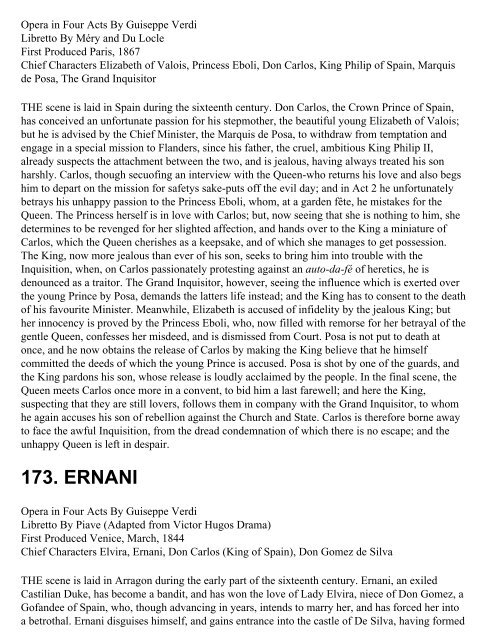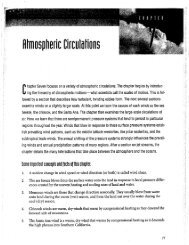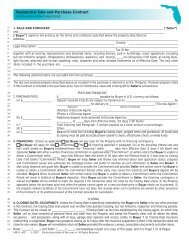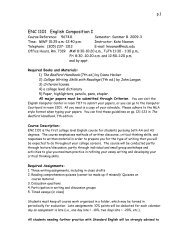Opera Plots I - MDC Faculty Home Pages
Opera Plots I - MDC Faculty Home Pages
Opera Plots I - MDC Faculty Home Pages
Create successful ePaper yourself
Turn your PDF publications into a flip-book with our unique Google optimized e-Paper software.
<strong>Opera</strong> in Four Acts By Guiseppe Verdi<br />
Libretto By Méry and Du Locle<br />
First Produced Paris, 1867<br />
Chief Characters Elizabeth of Valois, Princess Eboli, Don Carlos, King Philip of Spain, Marquis<br />
de Posa, The Grand Inquisitor<br />
THE scene is laid in Spain during the sixteenth century. Don Carlos, the Crown Prince of Spain,<br />
has conceived an unfortunate passion for his stepmother, the beautiful young Elizabeth of Valois;<br />
but he is advised by the Chief Minister, the Marquis de Posa, to withdraw from temptation and<br />
engage in a special mission to Flanders, since his father, the cruel, ambitious King Philip II,<br />
already suspects the attachment between the two, and is jealous, having always treated his son<br />
harshly. Carlos, though secuofing an interview with the Queen-who returns his love and also begs<br />
him to depart on the mission for safetys sake-puts off the evil day; and in Act 2 he unfortunately<br />
betrays his unhappy passion to the Princess Eboli, whom, at a garden fête, he mistakes for the<br />
Queen. The Princess herself is in love with Carlos; but, now seeing that she is nothing to him, she<br />
determines to be revenged for her slighted affection, and hands over to the King a miniature of<br />
Carlos, which the Queen cherishes as a keepsake, and of which she manages to get possession.<br />
The King, now more jealous than ever of his son, seeks to bring him into trouble with the<br />
Inquisition, when, on Carlos passionately protesting against an auto-da-fé of heretics, he is<br />
denounced as a traitor. The Grand Inquisitor, however, seeing the influence which is exerted over<br />
the young Prince by Posa, demands the latters life instead; and the King has to consent to the death<br />
of his favourite Minister. Meanwhile, Elizabeth is accused of infidelity by the jealous King; but<br />
her innocency is proved by the Princess Eboli, who, now filled with remorse for her betrayal of the<br />
gentle Queen, confesses her misdeed, and is dismissed from Court. Posa is not put to death at<br />
once, and he now obtains the release of Carlos by making the King believe that he himself<br />
committed the deeds of which the young Prince is accused. Posa is shot by one of the guards, and<br />
the King pardons his son, whose release is loudly acclaimed by the people. In the final scene, the<br />
Queen meets Carlos once more in a convent, to bid him a last farewell; and here the King,<br />
suspecting that they are still lovers, follows them in company with the Grand Inquisitor, to whom<br />
he again accuses his son of rebellion against the Church and State. Carlos is therefore borne away<br />
to face the awful Inquisition, from the dread condemnation of which there is no escape; and the<br />
unhappy Queen is left in despair.<br />
173. ERNANI<br />
<strong>Opera</strong> in Four Acts By Guiseppe Verdi<br />
Libretto By Piave (Adapted from Victor Hugos Drama)<br />
First Produced Venice, March, 1844<br />
Chief Characters Elvira, Ernani, Don Carlos (King of Spain), Don Gomez de Silva<br />
THE scene is laid in Arragon during the early part of the sixteenth century. Ernani, an exiled<br />
Castilian Duke, has become a bandit, and has won the love of Lady Elvira, niece of Don Gomez, a<br />
Gofandee of Spain, who, though advancing in years, intends to marry her, and has forced her into<br />
a betrothal. Ernani disguises himself, and gains entrance into the castle of De Silva, having formed













